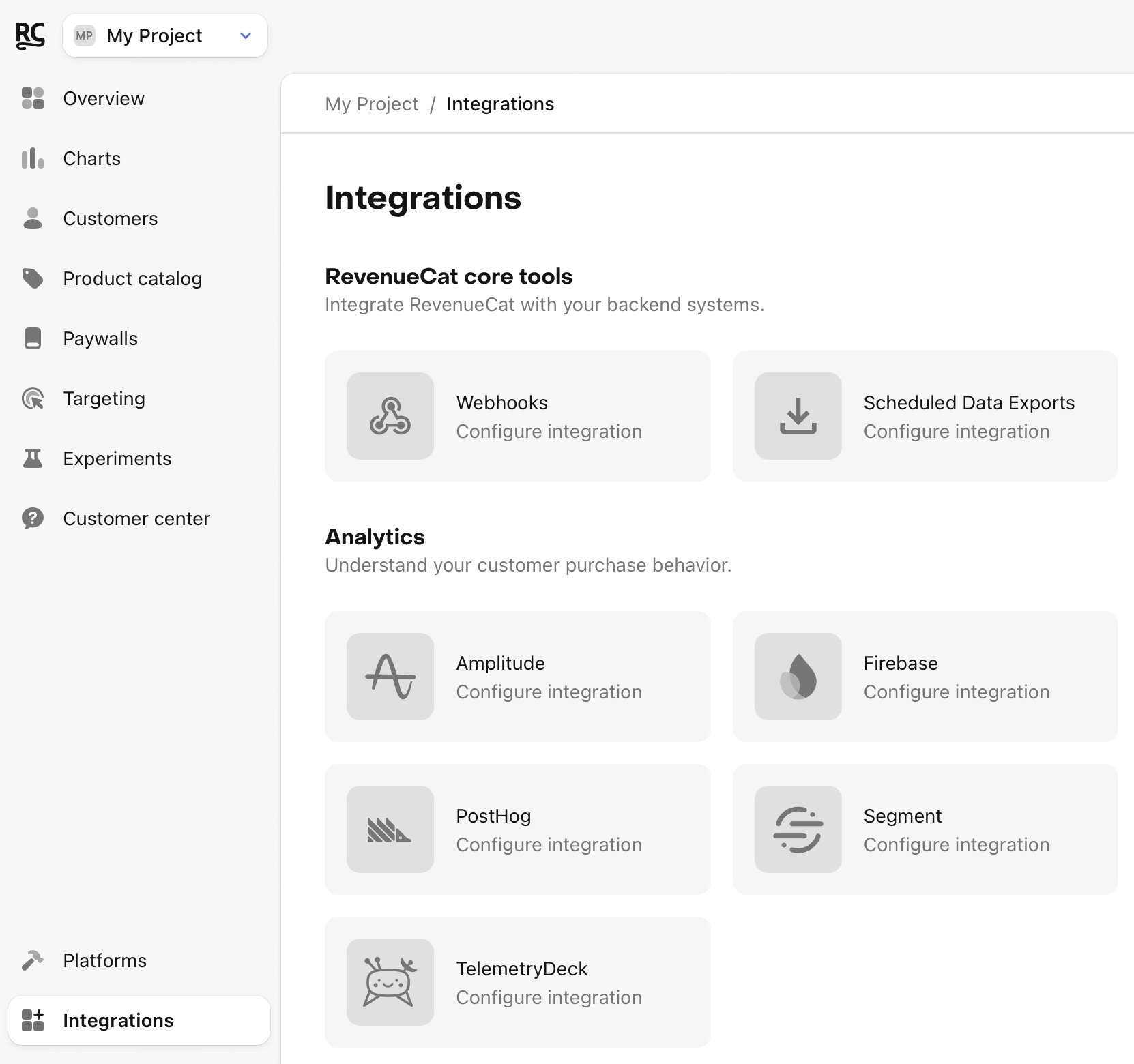Tenjin
Integrate Purchases SDK with Tenjin for precise revenue tracking
With our Tenjin integration you can:
- Accurately track subscriptions generated from Tenjin campaigns, allowing you to know precisely how much revenue your campaigns generate.
- Send trial conversions and renewals directly from RevenueCat to Tenjin, allowing for tracking without an app open.
- Continue to follow your cohorts for months to know the long tail revenue generated by your campaigns.
Integration at a Glance
| Includes Revenue | Supports Negative Revenue | Sends Sandbox Events | Includes Customer Attributes | Sends Transfer Events | Optional Event Types |
|---|---|---|---|---|---|
| ✅ | ❌ | ❌ | ❌ | ❌ | ❌ |
1. Send device data to RevenueCat
The Tenjin integration requires some device-specific data. RevenueCat will only send events into Tenjin if the below Attribute keys which are required have been set for the device.
| Key | Description | Required |
|---|---|---|
$tenjinId | The Tenjin Analytics Installation ID, the unique identifier from Tenjin for the device | ✅ (recommended) |
$idfa | iOS advertising identifier UUID | ✅ (iOS only) |
$gpsAdId | Google advertising identifier | ✅ (Android only) |
$idfv | iOS vendor identifier UUID | ❌ (optional) |
$ip | The IP address of the device | ❌ (optional) |
Even if a user has not granted permission to track, the IDFA attribute must be set to the iOS default provided value of 00000000-0000-0000-0000-000000000000 in order for events to be sent to Tenjin.
Due to policy changes from the Play Store, Android ID is no longer collected by RevenueCat's Android SDKs starting on versions 6.9.8+, 7.11.1+, and later major versions.
Therefore, Google's Advertising ID acts as the primary device identifier for Android devices in RevenueCat and when connecting with third-party integrations.
These properties can be set manually, like any other Customer Attributes, or through the helper method collectDeviceIdentifiers() and setTenjinAnalyticsInstallationID().
- Swift
- Kotlin
import AdSupport
// ...
Purchases.configure(withAPIKey: "public_sdk_key")
// ...
// Automatically collect the $idfa, $idfv, and $ip values
Purchases.shared.attribution.collectDeviceIdentifiers()
// Set the Tenjin ID
Purchases.shared.attribution.setTenjinAnalyticsInstallationID(tenjinAnalyticsId)
//..
Purchases.configure(this, "public_sdk_key")
//..
// Automatically collect the $idfa, $idfv, and $ip values
Purchases.sharedInstance.collectDeviceIdentifiers()
// Set the Tenjin ID
Purchases.sharedInstance.setTenjinAnalyticsInstallationID(tenjinAnalyticsId);
setTenjinAnalyticsInstallationID() is available on:
- iOS version 5.8.0+
- Android version 8.10.0+
- React Native version 8.2.7+
- Flutter version 8.9.0+
You should make sure to call collectDeviceIdentifiers() after the Purchases SDK is configured, and before the first purchase occurs. It's safe to call this multiple times, as only the new/updated values will be sent to RevenueCat. If the Tenjin ID is not set, events will be sent with only the platform-specific advertising identifier.
If you are requesting the App Tracking permission through ATT to access the IDFA, you can call .collectDeviceIdentifiers() again if the customer accepts the permission to update the $idfa attribute in RevenueCat.
The AdSupport framework is required to access the IDFA parameter on iOS. Don't forget to import this into your project.
(Optional) Send campaign data to RevenueCat
RevenueCat itself is not an attribution network, and can't determine which specific ad drove an install/conversion. However, if you're able to collect this information from another source, such as Tenjin, it's possible to attach it to a Customer in RevenueCat using Attributes as well. The below reserved key names can be used to optionally attach campaign data to a user. This data will then be sent through to other downstream analytics integrations and accessible via APIs and webhooks.
| Key |
|---|
$mediaSource |
$campaign |
$adGroup |
$ad |
$keyword |
$creative |
Make sure to remove all client side tracking of revenue. Since RevenueCat will be sending events for all revenue actions, tracking purchases with the Tenjin SDK directly can lead to double counting of revenue in Tenjin.
2. Send RevenueCat events into Tenjin
After you've set up the Purchases SDK to send attribution data from Tenjin to RevenueCat, you can "turn on" the integration and configure the event names from the RevenueCat dashboard.
- Navigate to your project settings in the RevenueCat dashboard and choose 'Tenjin' from the Integrations menu

- Add the Tenjin SDK key(s) for your iOS app and/or Android app if available, which can be accessed in the applicable app's settings; or add your universal SDK key if app-specific keys are not available (only applicable for legacy Tenjin customers).
- Select whether you want sales reported as gross revenue (before app store commission), or after store commission and/or estimated taxes.
RevenueCat must have the IDFA or ADID attribute of the user set at the time an event occurs in order to send that event to Tenjin. If IDFA access has not been granted, then the attribute should be set to the iOS default provided value of 00000000-0000-0000-0000-000000000000. If neither of these attributes are set, events won't be delivered, which means some of your total revenue won't be tracked by Tenjin. If events are being sent successfully in testing and for your users in production who have either of those attributes set, then the integration is working as intended to pair subscription revenue with campaign performance.
You should start seeing events from RevenueCat appear in Tenjin.